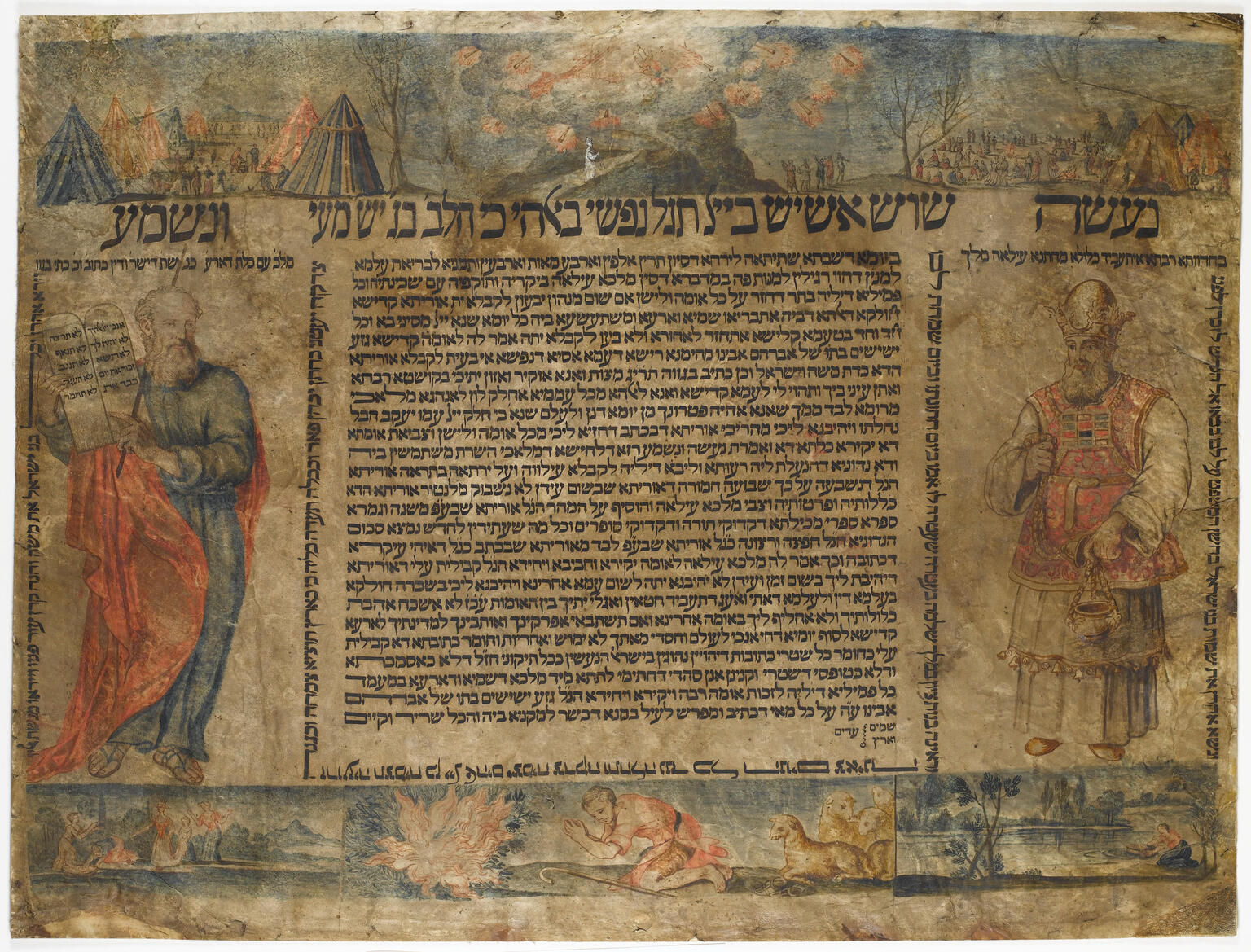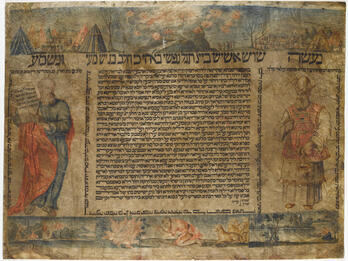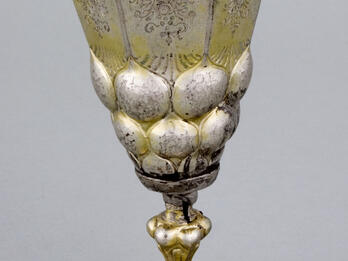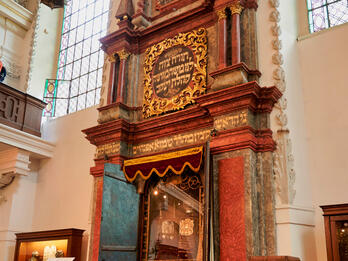Ketubah for Shavuot
The Ketubah between the Assembly of Israel and Their Father in Heaven, by the kabbalist R. Israel Najara, May the Memory of the Righteous and Holy One Be for a Blessing
On Friday, the sixth of the month of Sivan, in the year 2448 to the creation of the world, according to our counting here, at the ceremony of Mount Sinai, the honorable gentleman, excellent as the cedars (Song of Songs 5:15), the chosen one of the lower world, who is the King, the Holy One, said to this virgin, the Assembly of Israel, a daughter of fine lineage, the daughter of our Patriarch Abraham: Be to me my wife in accordance with the law of Moses and Israel, by accepting upon yourselves this Torah of Moses, the Written Torah and the Oral Torah. I will work for you—as the verse states: then I washed you with water (Ezekiel 16:9)—and honor you, as you will be for Me a kingdom of priests and a holy nation (Exodus 19:6), and feed and support you, with both spiritual and material food, every man under his vine and under his fig tree (1 Kings 5:5)—for they are the children of kings [see b. Bava Meẓi‘a 113b], the kingdoms of David and Solomon—in accordance with the custom of Jewish men, who work, honor, support, and sustain their wives faithfully.
Thus the King, the Holy One, accepted upon Himself to work for them and to honor them before all the inhabitants of the world, as the verse states: and to make you high above all nations of the earth [see Deuteronomy 26:19]—as in the future Jerusalem will reach all the way to Damascus [see Midrash Rabbah to Song of Songs 7:4]—and to sustain them with all types of sustenance, both on weekdays and on Sabbaths; and on Fridays to give them a double portion, each man in accordance with his eating [see Exodus 16:11–26].
And I will give to you the dowry of the virgins—for she is a virgin; no man has known her [see Genesis 24:16]—silver zuz, which are the thousand worlds of silver that she will inherit from the husband’s home, and two hundred—and two hundred for those who guard its fruit (Song of Songs 8:12)—to which you are entitled by Torah law. In addition, your food, clothing, and necessities of life, as these are the she’er, kesut and ‘ona [see Exodus 21:10]: she’er means food; kesut refers to the rabbinical robe, which is fashioned from Torah and mitzvot; and ‘ona is the conjugal time for Torah scholars, in accordance with the esoteric idea of the bride of Moses, as the verse states: and they will make for Me a sanctuary, and I will dwell among them (Exodus 25:8). He will provide these, in accordance with the universal custom, and He is obligated to bring them to a land flowing with milk and honey.
“And if you are captured, I will redeem you and restore you to me as a wife.”1 Likewise, this Groom obligates Himself to redeem the Assembly of Israel from exile, and not to leave them there among the nations, as the verse states: you who brings good tidings to Zion, get up to the high mountain (Isaiah 40:9); thus says the Lord God: Behold, I will lift up My hand to the nations, and set up My ensign to the peoples, and they shall bring your sons in their bosom and your daughters shall be carried upon their shoulders. And kings shall be your foster fathers, and their queens your nursing mothers; they shall bow down to you with their face to the earth, etc. (Isaiah 49:22–23). He will also rescue her from any trouble and distress.
“All the days you live as a widow in my house, you will sit in my house and be sustained from my property”—for she will receive all forms of bounty, from the seven liquid measures, and from the two constellations of notsar [“who preserves”] and ve-nakeh [“and clears”; see Exodus 34:7], via the holy channels, from where the bounty will come upon us, with blessings and success in all the work of our hands, and without any hindrance at all.
“And any male children you will have from me will inherit the money of your marriage contract in addition to their portion of the inheritance that they receive together with their brothers”—this is in accordance of the esoteric meaning of the verse: be lord over your brethren, and your mother’s sons will bow down to you (Genesis 27:29), and: you shall rule over many nations, but they shall not rule over you (Deuteronomy 15:6). For they will receive all the bounty and all good influences, as the verse states: and you shall eat your bread until satisfaction (Leviticus 26:5), and: the Lord will open for you His good treasure (Deuteronomy 28:12). All the nations shall receive only the residue from the land of Israel [see b. Ta‘anit 10a].
“And any female children you will have from me will sit in my house and be sustained from my property until they are taken by men”—the aforementioned Groom accepted upon himself all of these conditions, to provide for the Assembly of Israel even during the days of her widowhood.
“And this bride has agreed and become My wife, and this is the dowry that she has brought from her father’s house”—the commandment of circumcision, including peri’ah [laying bare the glans]; to deliver her soul for the sanctification of His blessed name; and to guard, perform, and fulfill His Torah;
“Whether through silver or gold”—to study His Torah, which is more desired than gold and fine gold (Psalms 19:11);
“Whether with ornaments”—by decorating the Torah with diverse commentaries on the levels of the plain, allegoric, midrashic, and esoteric interpretations, as in this manner the lofty bride is adorned with twenty-four ornaments with which she can enter the wedding canopy.
“With items of clothing”—these are the good deeds from which the rabbinical robe is fashioned, and through which she gains access to all four worlds: atsilut [the Archetypal World]; beriyah [the Creative World]; yetsirah [the Formative World]; and ‘asiyah [the Material World].
“Home utensils”—this is in accordance with the esoteric meaning of the verse: and they will make for Me a sanctuary, and I will dwell among them (Exodus 25:8), that He will not move away from us; behold, He stands behind our wall (Song of Songs 2:9) so that He can hear the sound of our prayers when we recite Shema‘ Yisra’el (Hear, O Israel).
“And beddings”—this is referring to the sacrificial rites in the Temple, when the priests are performing their service, the Levites are on their [singing] platform, and the Israelites are at their watches.
All this, the aforementioned Groom, the King, the Holy One, accepted upon Himself for one hundred zekukim of refined silver, which are the one hundred blessings that Israel blesses the Holy One each and every day. They donate these and thereby increase the power and might of the heavenly entourage. And the Holy One, this Groom, has agreed to add from His own property another matching one hundred zekukim of refined silver, which represent the secret of mayin nokvin [feminine waters], which descend from above, while an amount corresponding to all of them descends from all the ten sefirot. Since each of these is comprised from ten, this makes a total of two hundred of refined silver. This is the influence that descends every day after the prayers of the morning, as the verse states: and gives food to her household, and a portion to her maidens (Proverbs 31:15).
And this Groom declared the following: the obligation of this marriage contract, which is the Holy Torah, written in the form of black fire on white fire, is the obligation to pay the Assembly of Israel a good reward in this world and the world to come. This dowry is the two channels of gold—we shall hear and we shall do (Exodus 24:7)—and the acceptance of the yoke of Heaven and the 613 commandments. And the additional sum is the additional offerings of Sabbaths and festivals and the answering of “Amen, may His great name [be blessed, etc.],” as these add to the power of the heavenly entourage, in accordance with the esoteric meaning of the verse: ascribe strength to God (Psalms 68:35).
“I have accepted upon myself and my heirs who come after me”—these are the righteous ones of the generation who receive the inheritance of their Father in heaven.
“It can be paid from the entire best part of the property”—this refers to the treasuries of the lofty influence; 4,000 worlds of silver, sealed with the azakah dakhya [male ring]; the 370 lights that are revealed through the configuration of the worlds; the influence of the thirteen Attributes of Mercy; the nine rectifications of the lower configurations; the 310 worlds hidden under the Holy Throne, as in the future He will bequeath 310 worlds to each and every righteous person [see, e.g., b. Sanhedrin 100a]; the abundant goodness that is stored away for the righteous in the future; the influence of the seven firmaments, which are called Vilon, Rakia, Sheḥakim, Zevul, Ma’on, Makhon, and Aravot [b. Ḥagigah 12b] and which contain righteousness, justice, and charity, the treasuries of life, the treasuries of peace, and the treasuries of blessing.
“And the possessions that I own under all the heavens”—these are the seven treasuries and the land of life: the earth and all things that are upon it, the seas and all that is in them (Nehemiah 9:6).
“Whether I own it already”—this is His acquisition of heaven and earth;
“Or whether I will own it in the future”—this is referring to the three thousand generations which the Holy One has selected to place His spirit upon them and rest His presence among them.
“It includes both mortgageable property”—this is the land of our ancestors;
“And non-mortgageable property”—these are the lands of the rest of the nations, which are like moveable objects in relation to the former.
“All of it shall be mortgaged and bound as security to pay this marriage contract from them”—this even includes all the four worlds: Atsilut, Beriyah, Yetsirah, and ‘Asiyah, as they are mortgaged for the payment of this marriage contract,
“And this dowry”—“we shall hear and we shall do” and the 613 commandments,
“And this additional sum”—the additional land of the Kenite, and the Kenizite, and the Kadmonite (Genesis 15:19).
“Even from the cloak which is on my shoulders”—from the three worlds of Beriyah, Yetsirah, and ‘Asiyah—“from this day and forever.”
The aforementioned Groom, the King, the Holy One, accepted upon Himself the obligation of this marriage contract, etc. in accordance with the full obligations of all documents of marriage contracts and their additional sums, as is customary for the daughters of Israel. These are executed in keeping with the enactments of the sages, similar to the other enactments performed by Me in the upper worlds. “It is not a transaction with questionable consent, nor a template of documents,” and we have completed the act of acquisition of the heaven and earth from Him to the lady, the virgin Israel, daughter of the princes of the peoples and the nobles of the land, the kingdom of David and Solomon, “with regard to all that is written and detailed above.” For He has accepted upon Himself to sustain the Assembly of Israel with a good sustenance, without any interruption and without any hindrance of any kind—both a spiritual and a material sustenance, with great generosity, “by means of an object that is fit to be used in an act of acquisition”—this is the holy Torah, which is the implement of His craft—“and through two valid witnesses,” namely the heaven and the earth, as it is stated: I will call heaven and earth to witness against them (Deuteronomy 31:28). All is confirmed and established forever, Amen.
Mazal tov to all Israel forever; mazal tov!
Translated by Avi Steinhart.
Notes
[This and the many following quotations are standard phrases in marriage ketubot.—Trans.]
Credits
Israel (ben Moses) Najara, “Ketubah for Shavuot."
Published in: The Posen Library of Jewish Culture and Civilization, vol. 5.








